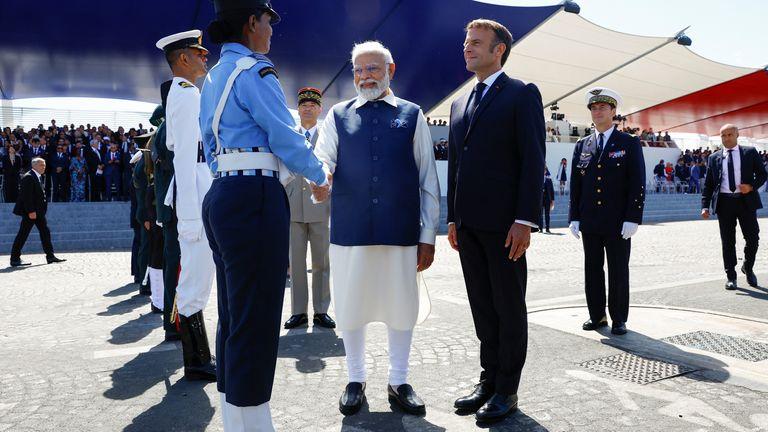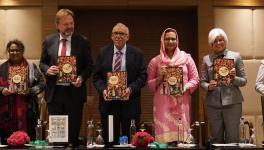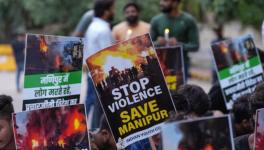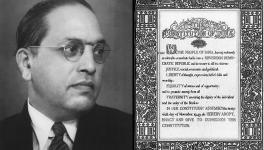Modi on Bastille Day as Liberty, Equality, Fraternity Stormed in India

Image credit: Sky News
On 16 November 2016, during a discussion in the Rajya Sabha, then Member of Parliament Sitaram Yechury famously said that Prime Minister Narendra Modi’s abrupt demonetisation of Rs. 1,000 and Rs. 500 notes reminded him of Marie Antoinette. On 8 November that year, the Modi government had demonetised 86% of the country’s cash in circulation, triggering an economic crisis that hit the poor the hardest. Soon after, Modi asked people to use plastic and digital currency instead of cash. This is what reminded Yechury of the last queen of France before the French Revolution, to whom a cruel remark is routinely attributed. While her country’s people faced hunger and poverty and struggled to buy bread, she is said to have remarked, “Why don’t they eat cake instead?” That is why Yechury used the moniker, Modi Antoinette, for one who asks those who don’t have paper to use plastic.
Criticisms of Modi in French Media
Almost seven years after that sarcastic remark, on French President Macron’s invitation, Modi was the guest of honour at the Bastille Day celebrations on 14 July. The invitation met with severe criticism from the French media. Well-known French personalities severely critiqued Macron’s decision to honour Modi at an event meant to commemorate the French Revolution’s slogan, Liberté, Égalité, Fraternité. The irony is that the 18th-century revolution marked the unity and strength of the masses, who rejected the divine right to rule of the monarchy, which they dethroned to usher in the constitutional scheme of governance.
The Indian Prime Minister, just a month ago, placed the sengol, which represents the divine right to power, in a new Parliament building he inaugurated. The idea and action were severely criticised in India and are also contrary to what the French Revolution represented. It is a historical fact that the French public suffered immeasurably under the social and economic crises caused by monarchical rule.
Attack on Democratic Rights
The French monarchy routinely and arbitrarily arrested dissenters and imprisoned them in fearsome prisons, including the Bastille Saint-Antoine fortress in Paris, which the revolutionaries destroyed. Since Modi became Prime Minister, scores of people have been sent to jail on serious charges, including sedition and terrorism. The incarceration of many has been seen as a result of their criticism of his policies or dissenting against his government’s decisions. Hindutva leaders have issued calls for the genocide of the Muslim minority in India, and BJP legislators have even demanded social and economic boycotts. Legislations enacted in BJP-ruled states appear based on the fictional notion of ‘Love Jihad’ and effectively make inter-religious marriages virtually impossible. Such measures rebel against the liberty, equality and fraternity of Indian citizens, not to mention the French Revolution.
In an opinion piece in the prominent French daily Le Monde, the authors Alice Mogwe and Patrick Baudouin write, “Modi, today’s internationally celebrated leader, is nonetheless a figure who has fostered state-sponsored violence for decades.” It describes Modi as a “hard-line Prime Minister” and asks, “Can we ignore the fact that India, under Modi’s leadership, is going through a serious crisis, with attacks on human rights activists, NGOs and journalists on the rise?”
Even the state-owned international TV network France 24 did not spare Macron. On its website, it published a report sharply focused on the arms trade between India and France and contrasted this with the lack of “democratic values” underpinning Modi’s visit.
Reuters reported on the ten personalities, including noted economist Thomas Piketty and former French ambassador to Denmark, Francois Zimeray, imploring Macron through a piece in Le Monde to “encourage” Modi to “end repression of the civil society, assure freedom of major media and protect religious liberty”.
Perhaps the French media and personalities were reminded of what Yechury saw almost a decade ago.
Nehru on Bastille Day
Jawaharlal Nehru had drawn a parallel between Bastille Day and India’s freedom struggle, which is worth recalling today. While Modi and his leaders routinely vilify Nehru, others should read his illuminating letter to his daughter, Indira, on 7 October 1932, published in his book, Glimpses of World History. “The fall of the Bastille,” wrote Nehru, “....meant the end of the old order in France, of feudalism and grand monarchy and privilege; it was a terrible and terrifying portent for all the kings and emperors of Europe.”
Nehru wrote of the terrible food shortages, the hunger of peasants and their forcible evictions, the military adventurism of the French monarchs, and the incarceration of critics. Nehru said that the conditions in France in 1789, before the storming of the Bastille, prevailed in India in 1932. He wrote about the patronising talk in India about “doing good” for the workers. “And yet we hardly think of them as individuals and human beings,” he wrote. He said that many Indian politicians thought and talked of constitutions and, simultaneously, forgot the human beings for whom constitutions and laws were.
Nehru’s words still resonate in India today. Modi’s government and governance style have created conditions of great suffering for ordinary people. The sengol installed in Parliament can only represent his disdain for that suffering. Dissenters and protesters have been arrested and languish in prisons,t while The Prime Minister says democracy is part of our DNA and launched an annual “Constitution Day” celebration during his first tenure. But there have been gross violations of even the most basic rights of people, and faith and political leanings have often been at the root of resurgent discrimination against the weak.
The resolution passed in the European Parliament disapproving of the Modi regime’s Hindutva-based approach, its suppression of the rights of minorities and continuing violence in Manipur are clear indications of the contrast between what India stood for and the direction in which it is headed.
The government of India has termed the resolution as interference in the country’s internal affairs, but that cannot diminish the contents of the resolution. Nothing stops the Modi regime from protecting and safeguarding minorities and upholding the Constitution and constitutional morality. Mere participation in Bastille Day celebrations, or any celebration overseas, is of little significance if his regime keeps curbing constitutional rights at home.
The author served as Officer on Special Duty to President of India K R Narayanan. The views are personal.
Get the latest reports & analysis with people's perspective on Protests, movements & deep analytical videos, discussions of the current affairs in your Telegram app. Subscribe to NewsClick's Telegram channel & get Real-Time updates on stories, as they get published on our website.
























